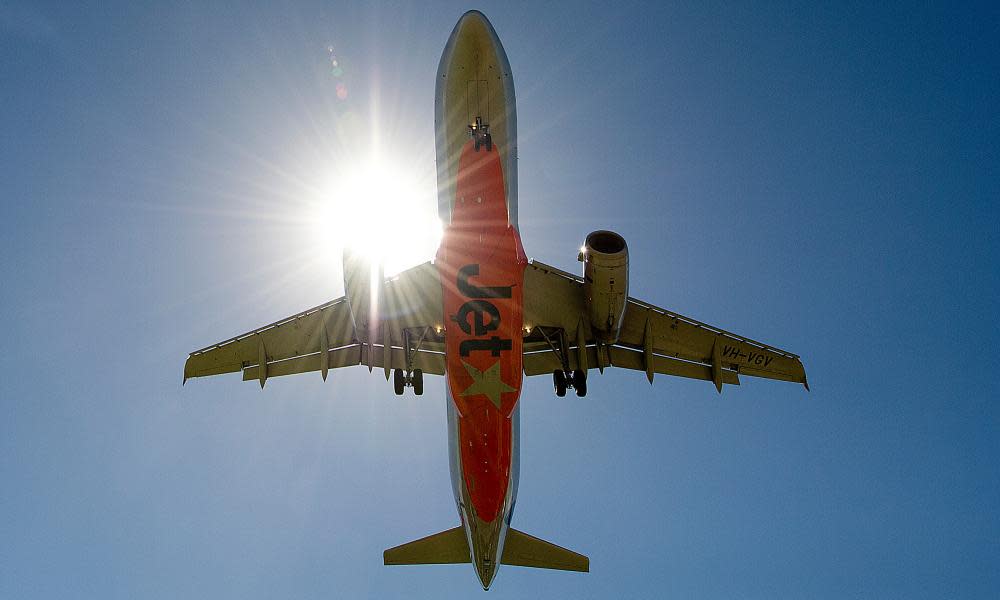Anger over aircraft noise expected to boost Greens’ election chances in Brisbane

A single issue is likely to swing some voters in at least three marginal seats in Brisbane this Saturday – and it is one that could prove fatal for both Liberal National and Labor party incumbents.
It is not the economy nor the climate crisis, though these will no doubt matter to many other voters.
Aircraft noise has become the defining local political issue for many of those who live under flightpaths since the day Brisbane airport opened its second runway in mid-2020.
Anger among those affected is white-hot, well-organised and is leading some rusted-on voters from both major parties to switch their votes to the Greens.
Related: Brisbane flight paths to be redrawn under new Morrison government plan
The minor party is promising a curfew and cap on flights, as well as changes to flightpaths which would send more planes over Moreton Bay.
The LNP also announced it would “rip up and redraw” Brisbane’s flightpaths last month, although Brisbane Flight Path Community Alliance chair, David Diamond, said some held a “natural cynicism” about that promise, given that the government had been brought “kicking and screaming” to the position on the eve of the election.
Labor says it will deliver a white paper to address aircraft noise and airport planning, a promise that has failed to salve the burning resentment some residents now hold against both parties.
Diamond said some felt “misled” by the way the billion-dollar runway project had been managed. “So there’s an integrity issue now as well,” he said.
An IT consultant and small businessman who lives in the riverside suburb of Bulimba in the electorate of Griffith, Alex Proctor, said he would normally be focused on the “big-hitter” issues of health, childcare, housing, education and the environment, and typically voted Labor.
But the 43-year-old father of two said his fears of increased aircraft noise meant his “only choice” at this election was to vote Greens. “I’ve never voted Greens in my life,” he said.
The LNP, too, seems destined to lose some voters, although toxic online debates mean many do not want to be publicly identified.
One who lives in the neighbouring suburb of Balmoral said he was a rusted-on LNP supporter of 50 years.
The man, who said he had done “pretty well” out of the resources industry, said the government had done a “reasonable job” nationally, and he didn’t trust Labor with the economy – the issue upon which he would normally vote.
“There are a hell of a lot of people out there hurting physically and mentally who are afraid to speak up,” he said. “Voting for the Greens is a private protest of anonymity.”
Both these voters live in Griffith, which is held by Labor’s Terri Butler on a margin of 2.9%.
In 2019 the LNP’s Olivia Roberts won the highest number of first-preference votes, 40.97%, compared with Butler’s 30.95%, and came second after preferences were distributed.
default
The Greens’ Max Chandler-Mather garnered a swing of 6.67% to win 23.65% last time and is hopeful of snatching the seat.
Chandler-Mather has run what the party describes as its largest door-knocking and listening campaign yet.
His team picked up on the “huge” significance of aircraft noise early last year. “I would say it’s probably one of, if not the biggest, local issue,” Chandler-Mather said. “In Griffith, it is not an overstatement to say there are thousands of new people voting for the Greens because of flight noise.”
Questions to Butler were directed to Labor’s campaign headquarters. A Labor spokesperson accused the Greens of making “empty promises they know they will never have to deliver” and said the LNP had “only discovered noise is an issue 10 minutes before an election”.
Roberts was also contacted for comment.
The issue has also proved a flashpoint on the other side of the river in the seat of Brisbane, which is held by the LNP’s Trevor Evans on a margin of 4.9%.
Brisbane is seen as a three-horse race, with the Greens candidate, Stephen Bates, likely to pick up protest votes because of the flightpath noise.
Evans was contacted for comment and responded with a statement that said he talked with constituents affected by “excessive and unreasonable” aircraft noise “every day”, and that the government had “responded decisively to this problem”.
Aircraft noise could also prove a factor in Ryan, held by the LNP on a margin of 6%.
The Brisbane Airport Corporation said it did not support curfews but backed changing flightpaths over Moreton Bay.
Susan Harris Rimmer, who teaches human rights and public policy at Griffith University, also lives in Griffith and said her letterbox was crammed with material about flight noise.
She agreed the issue would “play out best for the Greens” and acknowledged that the noise was distressing for those who lived where planes fly low.
But Harris Rimmer said there was a bigger picture that was being lost in the debate, citing a Climate Council report which places both Brisbane and Griffith in the top 10 federal electorates most at risk from climate change by 2030.
“If people think that their amenity is affected by [aircraft noise], just wait till they see how their amenity is affected by the climate impacts that are coming,” she said.
“That is a serious issues for those suburbs, and who is talking about it?”

 Yahoo Movies
Yahoo Movies 
